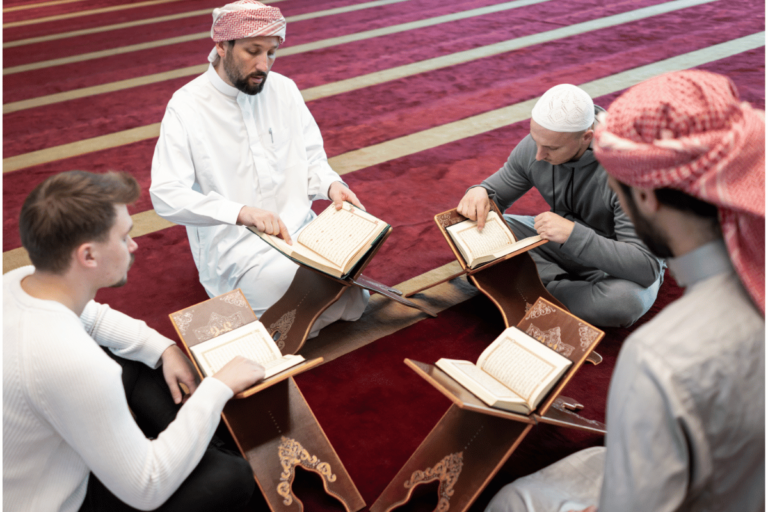Finding Inner Balance: Islamic Teachings for Prioritizing Well-being and Wellness
Embark on a spiritual journey guided by Islamic teachings, prioritizing self-care and well-being. Nurture your soul to strengthen the divine connection, fulfilling duties to body, mind, and soul. Through practices like Salah and Quranic reflections, find tranquility and mindfulness. Adhere to dietary guidelines, balancing physical and spiritual nourishment. Manage emotions and engage in healing rituals for emotional wellness. Maintain inner peace with spiritual connection, balancing work and rest harmoniously. Seek support from the community for a holistic approach to well-being. Explore the profound wisdom of Islam for inner balance, a path rich in spiritual growth and wellness.
Key Takeaways
- Embrace self-care for soul nourishment and divine connection.
- Prioritize mental health for worship and serving Allah.
- Engage in mindfulness practices like Salah and Quranic Reflections.
- Adhere to dietary guidelines for spiritual and physical well-being.
- Balance physical health with exercise, sleep, and hygiene in Islam.
Importance of Self-care in Islam
Embracing the concept of self-care in Islam isn't merely a physical act but a profound spiritual practice that nurtures the soul and strengthens the connection with the Divine. Engaging in self-care rituals isn't an essential endeavor but a necessary one to maintain overall well-being. In Islam, taking care of oneself is considered a fundamental part of fulfilling one's duties towards the body, mind, and soul, all of which are gifts from Allah.
The importance of self-care extends beyond the physical sphere; it encompasses mental health as well. The Prophet Muhammad (peace be upon him) emphasized the significance of maintaining good mental health through practices such as dhikr (remembrance of Allah), prayer, and seeking knowledge. By prioritizing self-care, you acknowledge that your mental health is just as vital as your physical health. It's a way to honor the body and mind that Allah has bestowed upon you, ensuring that you're in the best state to worship and serve Him.
Mindfulness Practices in Islam
Embrace the tranquility that Salah offers, allowing it to center your mind and spirit amidst life's chaos.
Engage in Quranic Reflections Practice to find solace and guidance in the verses of the Holy Book, nurturing your mindfulness and spiritual well-being.
Let the practice of Dhikr envelop you in a cocoon of inner peace, soothing your soul and fostering a deep connection with the Divine.
Salah for Mindfulness
Engaging in Salah, the Islamic practice of prayer, serves as a profound tool for cultivating mindfulness and spiritual presence in daily life. Mindful prayer not only nurtures your mental health but also provides a sanctuary of peace amidst the chaos of daily stresses.
When you perform Salah, you engage in a form of meditation that allows you to center your thoughts, calm your mind, and find solace in the remembrance of Allah. This practice of mindfulness through Salah enables you to release tension, alleviate stress, and achieve a state of tranquility.
Quranic Reflections Practice
Exploring Quranic Reflections Practice in Islam reveals a profound journey of mindfulness and spiritual enlightenment.
Quranic meditation involves deeply pondering over the verses of the Quran, allowing them to penetrate your heart and soul. This practice of spiritual reflection enables you to connect with the divine message, gaining insights and wisdom that guide your thoughts and actions.
By immersing yourself in the divine words of the Quran, you cultivate a sense of inner peace and tranquility, finding solace in the profound meanings encapsulated within its verses.
Through Quranic reflections, you begin a transformative journey of self-discovery, aligning your inner being with the spiritual essence of Islam.
Embrace this practice wholeheartedly, and let the Quran be a source of light and guidance in your life.
Dhikr for Inner Peace
Explore the practice of Dhikr for Inner Peace, a profound mindfulness practice in Islam that nurtures a tranquil state of being through spiritual remembrance and reflection. Dhikr involves repetitive utterances of phrases glorifying Allah, leading to a focused mind and a deeper connection to the divine. Through mindful breathing and reflective meditation, practitioners cultivate inner peace and tranquility, fostering a sense of calm amidst life's challenges. Below is a table highlighting key aspects of Dhikr practice:
| Dhikr Practice | Benefits |
|---|---|
| Mindful breathing | Enhances focus and presence |
| Tranquility practice | Calms the mind and heart |
| Reflective meditation | Promotes self-awareness |
Engage in Dhikr regularly to center yourself, find solace, and strengthen your spiritual well-being.
Dietary Guidelines for Well-being
To nourish both your body and soul, adhere to the dietary guidelines rooted in Islamic teachings for best well-being. In Islam, the concept of nutritional balance is deeply intertwined with spiritual well-being. By practicing dietary mindfulness, you not only care for your physical health but also cultivate a sense of gratitude and discipline in your relationship with food.
Islamic teachings emphasize moderation in eating, encouraging believers to consume food in just the right amount to maintain a healthy body and a sound mind. This practice of moderation extends beyond the physical domain and serves as a reminder of the importance of balance in all aspects of life. By being mindful of what you eat and how much you consume, you honor your body as a trust from the Creator, showing gratitude for the sustenance provided to you.
Physical Health in Islamic Teachings
Physical well-being in Islamic teachings forms the cornerstone of a holistic approach to health encompassing body and spirit. Islam emphasizes the importance of taking care of one's physical health as a means of honoring the body as a gift from the Creator. Engaging in regular exercise routines and adopting healthy habits are seen as acts of worship that contribute to overall well-being. The Prophet Muhammad (peace be upon him) encouraged his followers to maintain a balance in all aspects of life, including physical health.
| Exercise Routines | Healthy Habits |
|---|---|
| Regular physical activity is encouraged, such as walking or swimming. | Adequate sleep and rest are essential for rejuvenating the body. |
| Participation in sports that promote strength and agility is recommended. | Maintaining personal hygiene is a reflection of spiritual purity. |
| The practice of yoga or stretching exercises can help improve flexibility. | Eating in moderation and consuming wholesome foods is advised. |
| Engaging in outdoor activities, such as hiking or cycling, is beneficial for both body and soul. | Drinking plenty of water throughout the day is emphasized for hydration. |
Emotional Wellness and Islamic Perspective
You hold within you a profound ability to manage emotions guided by Islamic teachings, finding solace and peace through spiritual healing practices.
Embrace mindfulness in your daily life, allowing your heart and soul to be nourished by the wisdom and tranquility that Islam offers.
Through these practices, you can cultivate emotional wellness that aligns with the teachings of Islam, fostering a harmonious balance within yourself.
Managing Emotions in Islam
In the domain of emotional wellness from an Islamic perspective, understanding and managing one's emotions play a vital role in nurturing spiritual growth and overall well-being.
Emotional regulation holds significant importance in Islamic psychology, emphasizing the need to acknowledge and control one's feelings. Islam teaches that emotions are a gift from Allah, meant to guide and enrich life, but they should be managed wisely to maintain inner balance.
The Prophet Muhammad (peace be upon him) exemplified emotional intelligence by displaying patience, gratitude, and empathy in various situations. By following his teachings, Muslims are encouraged to channel their emotions positively, seeking solace through prayer, reflection, and seeking support from the community.
Through mindfulness and self-awareness, individuals can achieve emotional stability and strengthen their connection with the divine.
Spiritual Healing Practices
Embracing spiritual practices rooted in Islamic teachings fosters profound emotional healing and well-being, guiding you towards inner peace and harmony. Healing rituals within Islam are designed to nurture your soul and cultivate spiritual growth. By engaging in acts such as prayer, recitation of the Quran, and seeking forgiveness, you begin a journey of self-discovery and emotional rejuvenation. These practices serve as a means to reconnect with your inner self, find solace in times of distress, and seek comfort through faith. Through these healing rituals, you can cleanse your heart, alleviate emotional burdens, and attain a sense of tranquility that emanates from spiritual fulfillment.
| Healing Rituals | Description | Benefits |
|---|---|---|
| Prayer | Direct communication with Allah | Peace of mind, spiritual connection |
| Quran Recitation | Reading and reflecting on the Quran | Emotional healing, clarity of thought |
| Seeking Forgiveness | Asking Allah for forgiveness | Release from guilt, inner peace |
Mindfulness in Daily Life
Engaging in mindfulness practices throughout your daily life, rooted in Islamic teachings, leads to a profound alignment of emotional wellness and spiritual insight. Daily reflections allow you to cultivate gratitude, humility, and a deeper connection with the Divine. By being fully present in each moment, you can appreciate the beauty of life and find peace in the midst of challenges.
This mindfulness helps you acknowledge your emotions without judgment, fostering self-awareness and compassion towards yourself and others. Embracing the present moment with mindfulness enables you to let go of worries about the past or future, bringing tranquility and focus to your daily interactions and tasks.
- Cultivate gratitude and humility.
- Appreciate the beauty of life.
- Acknowledge emotions without judgment.
- Embrace the present moment fully.
Spiritual Connection for Inner Peace
Nourish your soul through the divine connection that brings tranquility to your inner being. Engaging in meditative practices can be a powerful tool for fostering spiritual growth and finding inner peace. By dedicating time to connect with the divine through prayer, reflection, and mindfulness, you open the door to a deeper understanding of yourself and your place in the world.
In the hustle and bustle of daily life, it's easy to become disconnected from our spiritual selves. However, prioritizing this connection is essential for maintaining a sense of balance and well-being. Through regular spiritual practices, you can cultivate a sense of inner peace that transcends the chaos of the external world.
Remember that nurturing your spiritual connection is a deeply personal journey. Take the time to explore different practices that resonate with you, whether it be reciting prayers, reading sacred texts, or simply sitting in quiet contemplation. Embrace this sacred time as an opportunity to recharge your spirit and realign your priorities for a more fulfilling life.
Balancing Work and Rest in Islam
Cultivating a harmonious balance between work and rest is a fundamental aspect of Islamic teachings for achieving well-being and spiritual fulfillment. In Islam, the concept of work-life balance is deeply intertwined with the idea of moderation and mindfulness in all aspects of life.
Here are four essential principles that Islam teaches to help you maintain this balance:
- Prioritize Prayer: In Islam, taking breaks for prayer throughout the day serves as a spiritual and mental reset, allowing you to step back from work and recenter your focus.
- Follow the Sunnah: Emulating the practices of the Prophet Muhammad, such as engaging in regular physical activity, can help you strike a balance between work and rest, promoting both physical and mental well-being.
- Practice Gratitude: Reflecting on and appreciating the blessings in your life can help alleviate stress and remind you of the importance of taking time for relaxation.
- Seek Knowledge: Islam encourages seeking knowledge as a lifelong journey. By continuously learning and growing, you can find fulfillment in both work and rest, creating a more balanced lifestyle.
Community Support and Well-being in Islam
Community support in Islam serves as a cornerstone for nurturing individual well-being and fostering a strong sense of interconnectedness among believers. Engaging with the community not only provides a sense of belonging but also offers a support system that plays an essential role in maintaining mental health awareness. In Islam, community engagement is emphasized through acts of charity, visiting the sick, attending congregational prayers, and participating in community events. These interactions not only strengthen the bonds between individuals but also create a network of emotional support that is vital for overall well-being.
| Importance of Community Support in Islam |
|---|
| Fosters a sense of belonging |
| Provides emotional support |
| Encourages acts of kindness |
| Strengthens social connections |
| Promotes mental health awareness |
Conclusion
As you journey through the depths of Islamic teachings on well-being and wellness, you're invited to embrace the delicate art of finding inner balance.
By prioritizing self-care, mindfulness, healthy dietary choices, physical health, emotional well-being, spiritual connection, and a harmonious work-rest balance, you're on a path towards holistic wellness.
Remember, in the tapestry of life, each thread of self-care and community support weaves a masterpiece of inner peace and tranquility.







